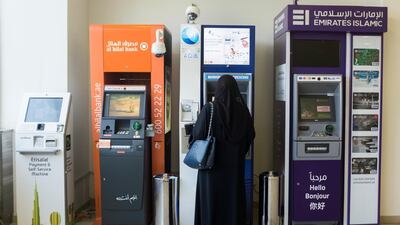The Central Bank of the UAE said on Tuesday it has set a maximum limit on fees and commissions charged by banks as the country seeks to woo more expatriates and boost non-oil growth.
The Central Bank capped fees on retail consumer-related banking services such as home loans and late fees for credit cards, it said in a statement. The fee caps will apply to 43 types of charges and all bank fees will be reviewed annually.
“Fee caps are being used as a tool to protect consumers from anti-competitive and unfair practices,” the Central Bank said. “This includes ensuring that entities do not automatically default to using the maximum caps when the actual costs are lower and banks will have to justify their increased costs in order to increase fees.”
The move is the latest in a series of measures by the UAE over the past month to attract foreign investment and diversify the economy from a reliance on oil revenues. The country has relaxed visa rules for jobseekers and tourists, reduced fees on companies to hire foreign workers, introduced full foreign ownership of companies outside free zones and announced economic stimulus packages worth billions of dirhams.
Expatriates make up 88 per cent of the UAE’s population of 9.2 million, according to the World Bank.
Banks have been consulted on the fee caps and are “comfortable” with the new regulations, the Central Bank said. It did not specify the size of the fee caps.
The banks will need to notify and seek approval from the regulator on plans to introduce new fees or a change of fees larger than 5 per cent, it said. The move is a part of the Central Bank’s push for more active supervision of the banking sector by adopting consumer protection measures.
The new caps are a positive development for consumers, potentially bringing relief to those struggling with mounting debt and encouraging home ownership by easing the burden of mortgage payments, analysts said.
__________
Read more:
Jerome Powell lauds US economy as Fed raises rates
Most GCC Central banks likely to mimic Fed as it prepares to raise interest rates
Fed set to hike interest rates as emerging markets struggle
Fed lifts rates, steepens path through 2020 for more hikes
UAE Central Bank raises interest rates by 25 basis points
__________
“Many people pay eye-wateringly high rates of interest on personal loans, credit card balances and consolidation loans,” said Steve Cronin, founder of DeadSimpleSaving.com, an independent community to help UAE residents invest on their own.
“The caps on fees will help more vulnerable people avoid getting trapped by their debt since they are the people most likely to be impacted by high rates.”
The introduction of fee caps means that banks, which previously covered their risk by charging high interest rates, will be forced to improve their risk-analysis systems, Mr Cronin said.
“The personal banking market is challenging in the UAE due to the large expat community, which brings a higher risk of people fleeing the country,” he said.
Now banks may “possibly turn down customers who might not have been suitable for loans in the first place”.
The fee limits, which apply to home loans, will help reduce the cost of mortgages and make more people eligible for home finance, said Jon Richards, chief executive of financial comparison website yallacompare. “Mortgage fees can become quite scary quite quickly in the UAE so any cap that helps drive down the cost of taking out a mortgage is welcome,” Mr Richards said.
The new measures would help to curb the practice of some banks hiding large fees in their services, he said.
“The new caps are designed to eradicate the practice of charging extortionate fees for certain services so that consumers can be clear about what they’re likely to be charged for and how much it will cost them,” Mr Richards said.
The UAE has loosened visa rules for students, job-hunters and tourists to stay longer in the country, attract talent, reduce remittance outflows, and spend more in a boost to the economy.
Abu Dhabi announced plans for a three-year Dh50 billion economic stimulus package to attract foreign investment and encourage new industries.

